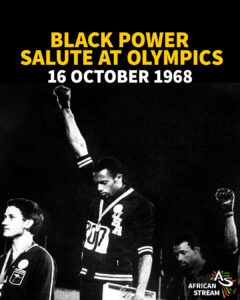On 16 October 1968, an unforgettable moment unfolded at the Olympic Games in Mexico City. As the US national anthem played, two sprinters, Tommie Smith (centre) and John Carlos (right), raised their gloved fists in the Black Power salute in silent protest against racism in the United States. They wore beads and scarves to represent their opposition to lynchings and black socks with no shoes to raise awareness about Black poverty in the US.
The Olympic Project for Human Rights fought for hiring Black coaches, including Black people on the Olympic Committee, and barring apartheid South Africa and white-run Rhodesia (now called Zimbabwe). Some athletes in the project boycotted the Olympics, but Smith and Carlos saw the opportunity to raise their issues.
Smith and Carlos’ defiance on the world stage came at a significant personal cost. Even though Smith had won gold and Carlos earned bronze in the men’s 200-metre event, the International Olympic Committee condemned the pair, while the US team banned both athletes and sent them home early. This move effectively ended their careers, and they faced death threats. Their marriages fell apart, and Carlos found it challenging to find employment for years afterwards.
Smith and Carlos’ brave move came during a tumultuous year in the history of the Civil Rights Movement and the Black Power Movement. In April, a gunman assassinated the Rev Dr Martin Luther King, Jr (1929-68). Plus, the anti-war movement had gained momentum thanks to opposition against the US imperialist war against Vietnam.
During the 1960s, life was tough for Black people in the US. Their average life span was seven years lower than that of white people. Compared to white children, Black children had only half the chance of completing high school, only one-third the possibility of obtaining a bachelor’s degree, and a third the chance of entering a profession upon becoming adults. On average, our people earned half of what white people did and were twice as likely to be unemployed.
Nearly 60 years later, despite the passage of the 1964 Civil Rights Act and the 1965 Voting Rights Act, the struggle for equality continues. Black people earn 24 per cent less than white and are five times more likely to be incarcerated, making up half of the prison population despite only being 13 per cent of the US population.
Given the persistent racial disparities in the US, is the Black Power salute as relevant today as it was in 1968?
Sources:
https://www.digitalhistory.uh.edu/disp_textbook.cfm?smtid=2&psid=3323
https://www.history.com/news/black-athletes-raise-fists-1968-olympics
https://www.sciencedirect.com/science/article/abs/pii/S0169721811024087
Prison population
https://www.pewtrusts.org/en/research-and-analysis/issue-briefs/2023/05/racial-disparities-persist-in-many-us-jails

1 Comment
I learned so much from this post—thank you!